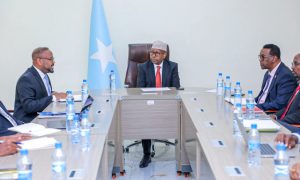
Ramadan Rajab | 26 September 2016 | As guns continue to fall silent in Somalia’s waning civil conflict, exponential growth has been witnessed in the higher education sector. But there are mixed reviews of the quality of education offered by the country’s new independent universities.
Before the 1988 civil war and subsequent collapse of the central government in 1991, Somalia had only one state-owned university, Somali National University.
The university – established in the capital Mogadishu in 1970 – was forced to close in 1989 due to the instability. It only reopened 25 years later, in 2014. Meanwhile there was a higher education vacuum, bound to be filled.
A 2013 report from the Somali think-tank, the Heritage Institute for Policy Studies, on The State of the Higher Education Sector in Somalia, noted that rapid growth in tertiary education was under way from 2003.
Between 2004 and 2014 there were at least 50 institutions in Somalia claiming to be offering higher education and teaching more than 50,000 students. Of 44 surveyed by the think-tank, 34 were established during that period, according to the report.
Rapid growth
And growth has exploded in the past two years.
“Currently we estimate that there are over 100 higher education institutions in the country,” Mahad Wasuge, a senior researcher at the Heritage Institute for Policy Studies and an education expert, told University World News.
More than 60 of the universities are in Mogadishu, according to Abdulkadir Abdi Hashi, the minister of education, culture and higher learning, who spoke to University World News.
The boom has given Somalia more universities than its neighbours – Kenya has 58, Tanzania around 47 and Ethiopia 36, despite their being relatively stable, while Somalia’s government does not fully control its own country.
Apart from the public Somalia National University, all other higher education institutions are privately run by diaspora groups, religious organisations, non-governmental organisations or local communities.
Improving security and the growth of secondary education – which is provided by both the public and private sectors in Somalia – along with lack of government involvement in higher education had driven people to create universities as business entities, said Wasuge.
“It’s only in the last year or so that we have seen some government involvement in higher education, but in the past government was never involved, giving room for anyone with cash to invest in the sector at will.”
Concerns about quality
Wasuge added that there are significant concerns that many students are not receiving a decent higher education and so are not sufficiently competitive in the workplace, with university operators keener to make money than to raise education standards.
Still, higher education growth has given many Somalis an opportunity to transition from school to receive some form of higher education.
Because there are no comprehensive national higher education laws and no national commission for higher education, the sector is run haphazardly with no curricula guidance or quality benchmarks or other key forms of support.
Unfortunately the majority of tertiary institutions offer similar courses, thus imparting an insufficient variety of the skills that are needed to achieve national reconstruction in the war-blighted country, said Wasuge.
“These institutions are majoring in social sciences, IT and administration, meaning we risk churning out students with similar skills,” he said, hoping that in future more faculties of mining, agriculture and marine studies will be opened to help grow key economic sectors.
Ahmed Ali is one student who may help this process in future. He is a second-year engineering student at Amoud University, an NGO-run institution in the breakaway territory of Somaliland, which operates as a de facto independent state in northern Somalia.
He said the proliferation of universities had given aspiring students options, but the boom had strained lecturers’ capacity to teach effectively.
“I started off this course in another university that I won’t name, but was forced to discontinue and come here because lecturers were few and didn’t have enough time for us, because either they were part-timing or moonlighting in other universities,” he said.
Students experienced such problems at other institutions, he added, as well as shortages of equipment, while seminars and academic conferences were rare.
Lack of regulation
“If there is an unregulated sector anywhere there is always a tendency of everyone with money rushing to invest, and this is what the sector is grappling with,” said Professor Abdullahi Ahmed Barise, president of City University of Mogadishu, a private institution.
He said some institutions had low standards in choosing lecturers. As long as students kept paying fees they were happy. They profited from the fact that students often choose institutions according to where their friends studied and the cost of courses.
However, Barise predicted that going forward, the high number of universities would spark competition, which would promote and enhance quality – institutions would have to raise their game in order to attract and retain students.
“In such an environment the strong ones will survive whereas the weak will fall by the wayside,” he explained.
Moreover, a Somali Research and Education Network has been established by some Somali universities to develop common standards and set benchmarks, aiding self-regulation and organising peer reviews to influence positive growth.
“There is ongoing transformation as calls for regulation grow and voices for the passage of higher education laws and creating a commission on higher education to enforce the law and offer quality assurance get louder,” Barise said.
To bridge the lecturer shortage, he advised institutions keen on quality to campaign to woo Somali professors abroad to return home, and to recruit tutors from other countries.
He called for the creation and strengthening of faculties within universities that are geared towards the reconstruction of Somalia, and urged professional associations and development partners to help them achieve such growth.
Mixed bag of fortunes
Education Minister Hashi said: “The rapid growth has brought a mixed bag of fortunes. It has led to the liberalisation of the sector which is good, [but] due to decades of disorder in the past there have been many institutions that add little to the sector and that’s the downside.”
He is looking ahead to scheduled parliamentary elections this month and in October.
“We are determined to bring sanity to the sector, and hopefully after the elections we will have higher education laws and laws establishing a commission for university education, among other policies, passed and enacted.
“Once these laws and structures are in place I am sure that less than 15 universities will survive. At the moment we have fewer than 10 institutions that have what it takes to be called a university,” he claimed.
.
.
.
.
_________________________
_____________________________________________________________________________________
Xafiiska Wararka Qaranimo Online | Mogadishu, Somalia
_____________________________________________________________________________________Advertisement
_____________________________________________________________________________________







